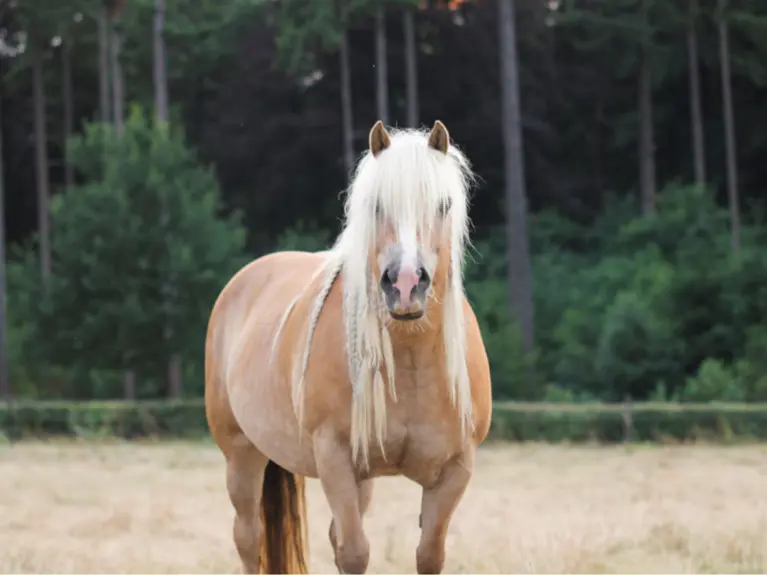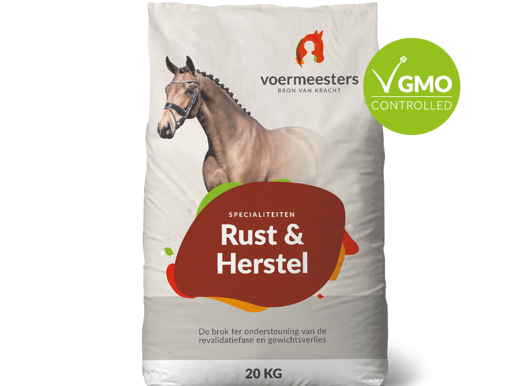
Helping your horse lose weight responsibly
Help, my horse is overweight! Does your horse or pony struggle with excess weight? You’re not alone: many horses and ponies in our country are carrying too many kilos. They easily store surplus energy as fat. But how can you help your horse or pony lose weight in a healthy way? The answer lies in the right combination of sufficient exercise and the right feed.
More energy than needed
When does a horse or pony become overweight? The principle is the same as with people: when more energy goes in than is used. Often this happens without realizing it. For example, do you ever give an extra scoop of concentrate as a reward after riding? Many horses and ponies receive more concentrate this way than they actually need. Combine this with energy-rich forage, a few bites of bedding, and sometimes too little exercise, and you’ve got the perfect recipe for an overweight horse.
With hardy breeds such as Fjords, Haflingers, Tinkers, Friesians, Shetlands, and Icelandics, you need to be extra careful. These breeds thrive on relatively little feed. Their metabolism is naturally very efficient and makes the most of nutrients.
When is a horse too fat?
How do you know if your horse or pony is overweight? As a general rule, a horse is “in good condition” when the ribs are not visibly sticking out, but you can still feel them easily under the skin with your fingertips.
For a more structured check, you can use the equine welfare check to determine your horse’s Body Condition Score (BCS). If the score is +1 or +2, your horse is overweight. In that case, weight loss is the only healthy option. Overweight horses are much more prone to health issues such as laminitis, EMS, obesity, and insulin resistance.
Consult your veterinarian
If you suspect your horse or pony is overweight, don’t start a diet plan on your own. Always consult your veterinarian or an equine weight consultant first. They can determine whether your horse really has a weight issue, using a scale or by palpating fat deposits on the neck, shoulders, ribs, and tailhead.
Healthy weight loss
For horses, healthy weight loss means about 1% of body weight per week. The challenge is to ensure your horse or pony still receives enough nutrients, vitamins, minerals, and trace elements. Simply reducing feed drastically can cause serious problems.
Horses produce saliva primarily while chewing. Saliva helps neutralize stomach acid. If a horse chews less, it produces less saliva, which increases the risk of gastric issues. That’s why it’s not advisable to simply cut back on forage.
Don't lose weight to quickly
If weight loss occurs too quickly, fat can enter the bloodstream. Normally, this is a controlled process, but in cases of stress, obesity, or insulin resistance, the reaction can be excessive. Too much fat in the blood leads to a condition called hyperlipidemia. Because a horse’s digestive system is highly sensitive to changes, veterinary supervision is essential.
Gradual reduction
In consultation with your veterinarian or with Voermeesters, you can gradually reduce your horse’s energy intake, up to a maximum of 30%. First calculate the energy value of your current feed, then adjust step by step to the new target. For weight loss, coarse and low-energy forage is the best choice. Having your forage analyzed gives you the clearest insight into its actual energy value.

Adjusting the energy balance
Do you have a clear picture of how to reduce your horse’s energy intake? Then the real work can begin. To achieve weight loss, your horse must use more energy than it consumes. Make sure your horse gets plenty of daily exercise. Reduce the amount of energy-rich concentrate, but ensure that it still receives enough vitamins, minerals, and trace elements. For this purpose, Voermeesters offers a suitable feed: Rust en Herstel. These cubes contain a high level of vitamins, minerals, and trace elements, yet has a low energy value. In other words, you can limit energy intake while still meeting your horse’s nutritional requirements, something you cannot achieve by simply cutting the existing ration in half. Thanks to its high protein content, Rust en Herstel also helps prevent muscle loss during weight reduction.
Other tips
Limit pasture access or place your horse in a very sparse paddock. Weigh feed portions carefully, and keep monitoring your horse. Achieving the desired condition and weight often takes months—sometimes up to half a year. In the meantime, track whether weight loss is on schedule and whether your horse remains healthy. Weight reduction is important for overweight horses, but it must always be done responsibly. For your horse’s health, it is crucial to maintain sufficient intake of essential nutrients. Unsure whether your horse is still receiving enough? Ask Voermeesters for advice.
Feeding advice from Voermeesters
Would you like to learn more about Voermeesters Rust & Herstel or receive a tailored feeding plan for your horse? Feel free to get in touch, we are happy to answer all your questions.

